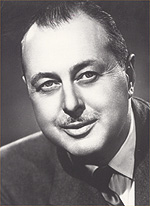
|
|
| Date Published: |
Biographies of Prominent Quebec Historical Figures
Paul Sauvé
Claude Bélanger, Sauvé was born in 1907 in St. Benoit, near Montreal. His father was Arthur Sauvé who sat in the National Assembly representing the riding of Deux-Montagnes between 1908 to 1930. His father was one of the few remaining members of the Conservative Party in the Quebec Legislature. He headed the party between 1922 and 1929. In 1930, Arthur Sauvé ran in the federal elections for the Conservative Party and was elected; he was appointed to the federal cabinet in the Bennett government. In 1935, Sauvé was appointed to the Senate. Thus, Paul Sauvé was born into a highly politicised family, one associated
with the Conservative Party. In the context of Quebec in the early part
In 1931, Paul Sauvé joined the army reserve, a decision that was highly unusual in French-speaking Quebec at the time. The army was percieved as a foreign body, functioning almost exclusively in English, giving little opportunity to francophones for advancement, and seen as evidently discriminatory. Yet, Sauvé rose in the ranks. Soon after the Second World War broke out he joined the Fusillers Mont-Royal and served overseas while still retaining his seat in the National Assembly. He participated in the Normandy landing in 1944 and was awarded the “Croix de Guerre” by the French government. Sauvé played an instrumental role in the creation of the Union Nationale in 1935-36. From 1936 to his death he was a Union Nationale member of the National Assembly under the leadership of Maurice Duplessis. In 1946, Sauvé was appointed minister for youth and social affairs. As such, he enjoyed a very special relationship with Duplessis. All historians of the Duplessis era know that, for the most part, ministers in the cabinet of Duplessis were mere bit-part players, only there for the form and for the amusement of Duplessis. He gave them hardly any authority and freedom. In fact, he ran a one man show. He frequently delighted in slighting his ministers and certainly never took them seriously as a group. To this general picture there was only one real exception: Paul Sauvé. For reasons difficult to grasp fully, he was the only minister to obtain the support, respect and confidence of Duplessis. The “boss” did not interfere with his department; he never criticised him publicly; he was supportive in all possible ways. Perhaps this was because of the long standing conservative tradition in the Sauvé household and the respect that Duplessis felt for the father of Paul Sauvé; perhaps Duplessis held the military career and honours that Sauvé had in high esteem. Surely it must have been a reflection of the capabilities, the intelligence and the honesty of Sauvé. Certainly, it was because Sauvé was the only one of the ministers not to grovel continuously before the leader. Given the stature he held in the cabinet, the respect shown to him by his colleagues, and the evident aura of heir apparent that surrounded him, he was a natural choice of leader for the Union Nationale party upon the death of Duplessis in 1959. Upon becoming leader of the party and premier of the province in the fall of 1959, he delivered a radio message broadcasted throughout the entire province and which was to be of great significance. In it, Sauvé outlined the programme he would follow, one that was distinctly progressive in tone and content, pledged to purge the province of the corruption that had characterised the past, and called on all Quebecers to work together for the greater prosperity of the province and the well-being of its citizens. He promised that things would change and committed the government to a course of action and behaviour radically different from the past, an obvious rejection of “duplessisme”. Every paragraph of his speech started with the word: désormais [from now on, henceforth]. The strength and obvious sincerity with which the message was delivered had profound effects on the population. The people of Quebec believed him when he promised changes, so much did they long for the future to be brighter and freer than the past. Duplessisme was dead; henceforth, things would be done differently. As we reflect on the significance of this speech, its obvious sincerity, and the extent to which it caught the imagination of the Quebec people, we can find no other similar parallel except in the famous Martin Luther King’s “I have a dream” speech. Both of these speeches were made at crucial times in the history of the people to whom they were addressed and all knew that they had witnessed a moment of history when they heard the speech. All realised that the world as seen by the people would be different after they had heard the speech. In Quebec, the speech unleashed the floodgates of freedom, of hope, of reflection, of creative energy. It was the beginning of the Quiet Revolution. Sauvé was true to his word. Everywhere a sense of movement was felt. Dossiers - social, economic or federal-provincial - were opened, discussed, moved forward. The first hundred days of his regime [“les cent jours”] were filled and exhilarating. And then it all came to an end! He died on January 2, 1960, less than four months after coming to office. The death of the two most prominent leaders of the Union Nationale so close in time sent the party into disarray. Soon, after provincial elections were called, the voters turned to the Liberals of Jean Lesage. He was to be the one that history would associate with the Quiet Revolution.
|
© 2003
Claude Bélanger, Marianopolis College |
|
 of the century this was an anomaly. Paul Sauvé did his studies at the
of the century this was an anomaly. Paul Sauvé did his studies at the